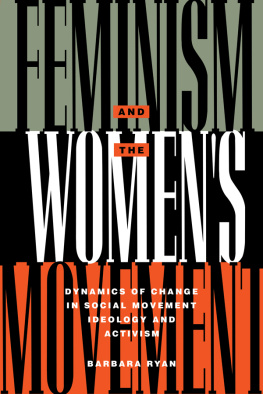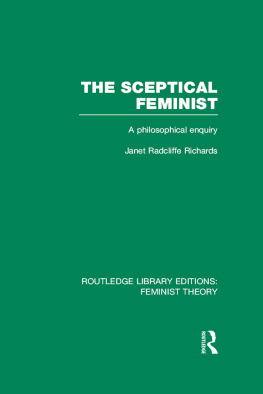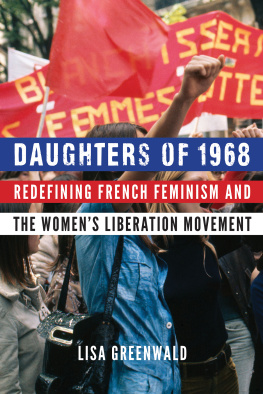2016 by the University of Georgia Press
Athens, Georgia 30602
www.ugapress.org
All rights reserved
Designed by Kaelin Chappell Broaddus
Set in 10/13 Kepler Std by Graphic Composition, Inc., Bogart, Georgia
Most University of Georgia Press titles are available from popular e-book vendors.
Printed digitally
Library of Congress Cataloging-in-Publication Data
Names: Allured, Janet, author.
Title: Remapping second-wave feminism : the long womens rights movement in Louisiana, 19501997 / Janet Allured.
Description: Athens : University of Georgia Press, [2016]
Identifiers: LCCN 2015047526| ISBN 9780820345383 (hardcover : alk. paper)|
ISBN 9780820350042 (e-book)
Subjects: LCSH: Second-wave feminismLouisianaHistory. | FeminismLouisiana
History20th century. | Womens rightsLouisianaHistory20th century. |
WomenLouisianaSocial conditions2oth century.
Classification: LCC HQ1438.l8 a45 2016 | DDC 305.420976309/04dc23
LC record available at http://lccn.loc.gov/2015047526
ACKNOWLEDGMENTS
This book would not have been possible without the help and financial support of a considerable number of entities, institutions, and individuals. The university where I have taught since 1989, McNeese State in Lake Charles, is classified as a teaching institution. Providing me with occasional relief from my four-course-per-semester workload allowed me to pursue research and find the time necessary to put it together in coherent form. I am grateful for the sabbatical year of 20078, and the leave time in 2012 made possible by a Board of Regents Award to Louisiana Artists and Scholars (ATLAS), the first ever awarded to a faculty member at McNeese. Jeannie Robertson and Janet Wool-man in the Office of Research Services provided invaluable guidance throughout that process. Another leave allowed me to accept a yearlong position as a visiting scholar at Newcomb College Institute in 201314. Without the assistance of Newcomb director Sally J. Kenney, Newcomb archivist Susan Tucker, Laura Wolford, and the rest of the staff there, this book would never have seen the light of day.
I also benefited from funds established for the support of faculty research at McNeese, particularly the Evelyn Shaddock Murray Professorship in History and the Violet Howell awards. The Hardtner family deserves special recognition for its beneficence. Sisters Violet Hardtner Howell and Juliet Hardtner (191896), born in Alexandria, Louisiana, were daughters of Henry E. Hardtner, a lumberman known as the father of modern forestry in the South. Violet, married with three sons of her own, took in and raised Juliet after both her parents died while Juliet was still a teenager. Juliet graduated from Goucher College in Baltimore, Maryland, and became a lieutenant in the navy during World War II. A member of the WAVES, she was awarded the American Defense and the World War II Victory Medal ribbons. After the war, she left the service and moved to New York City, surrounding herself with a circle of intellectuals and close friends. An independent soul, she never married and became a patron of female artists and scholars. She moved back to Lake Charles in 1990 to live her last years near her family. Since she had no children, she decided to donate her substantial fortune entirely to charity, especially to causes that benefited women and education. The Episcopal Church of the Good Shepherd in Lake Charles, Louisiana, and the associated school, the Bishop Noland Episcopal Day School (EDS) benefited, and so, too, did McNeese. Violet Howell and Violets son, William D. Billy Blake, ensured that Juliet Hardtners final wishes were carried out and that her endowments are dedicated to supporting faculty research and publication on women. I received quite a few of both awards over the years, and those grants made it possible for me to tell the previously unknown story of Louisiana warriors for gender justice. I think both Violet Howell and Juliet Hardtner would be pleased with the result.
No research project of this magnitude is ever accomplished without the expertise and guidance of librarians and archivists. I owe my biggest debt of gratitude to Susan Tucker, longtime archivist at Newcomb, who in many ways inspired this work. She and Beth Willinger had a vision of Newcomb College as a repository for Gulf Coast womens history, and in the 1990s, Tucker began collecting documents from second-wave feminists. Around 2000, she and the Newcomb staff sponsored a series of symposia on the subject. The subsequent web display caught my attention, just in time for my sabbatical year of 20078. I knew immediately that I had found the subject that would become my next academic monograph. Susan retired from Newcomb in 2015, but the archive will be her lasting legacy and is now in the good hands of Chloe Raub, who picked up where Susan left off and assisted me as I made the final touches on the manuscript. Leon C. Miller, head of Tulanes Louisiana Research Collection, and his able assistant, Sean Benjamin, deserve special attention for recruiting, cataloging, and conserving an important collection of New Orleans womens history materials (some of which were salvaged from Katrinas flood waters and freeze-dried in order to preserve them). Art Carpenter and Trish Nugent in the Special Collections Department of Loyola University allowed me to sift through the papers of Janet Mary Riley before they were processed. Laura L. McLemore, head of Archives and Special Collections at the Noel Memorial Library at LSUShreveport, and Florence Jumonville, who presided over the Louisiana Room in the Earl K. Long library at, UNO for many years, proved equally valuable. Jean S. Kiesel, librarian at the Louisiana Room, helped enormously with photo selections from the wonderful Ollie Osborne collection. The papers of Acadiana feminist Ollie Osborne were collected and deposited by Vaughan Burdin Baker, who understood the importance of womens archives. Finally, the capable assistance of librarians at McNeese also made this book possible. Jessica Hutchings, Walt Fontane, Pati Threatt, Janet Woolman, and David Guillory as well as the many library staffers who invariably delivered efficient service with a smile made long-distance research not only possible but fun.
Preserving documents in the midst of the storms that regularly befall the Gulf Coast is not an easy task. Many people whose stories I wanted to tell had no documents left to give me. I relied instead on their recollections, which often required many hours of face-to-face interviews and follow-up emails and phone calls. I am exceedingly grateful to those movement participants (listed in the appendixes) and to their family members who gave of their time and willingly shared their stories with me. Occasionally, they were able to recover a few dusty documents from someones attic. Those, too, have been deposited at Newcomb.
I owe great debts to the scholars who, with no thought of reward or compensation for themselves, read and commented on conference papers, chapters, and drafts of the manuscript. Like me, they sought only that the final product be accurate. For their invaluable insights I thank Sara Evans, Alecia P. Long, Pamela Tyler, Harold L. Smith, Ellen Blue, and Marjorie Spruill; Michelle Nickelson, Joan Johnson, Gail S. Terry, Linda Sturtz, and others at the Newberry Library seminar on women and gender; scholars of the Delta Women Writers colloquium; and my smart and supportive colleagues at McNeese: Derek Blakeley, Michael Crawford, Philippe Girard, Martha Hoskins, Bobby Keeling, Michael T. Smith, and Rachel Williams. Amanda Ogea, a McNeese graduate who will likely become a published writer herself soon, offered excellent feedback on the introduction. Megan Taylor Shockley at Clemson University, while hard at work on her own history of second-wave feminists in Virginia, read a draft of the entire manuscript and offered sage comments. I am deeply thankful to them all.






